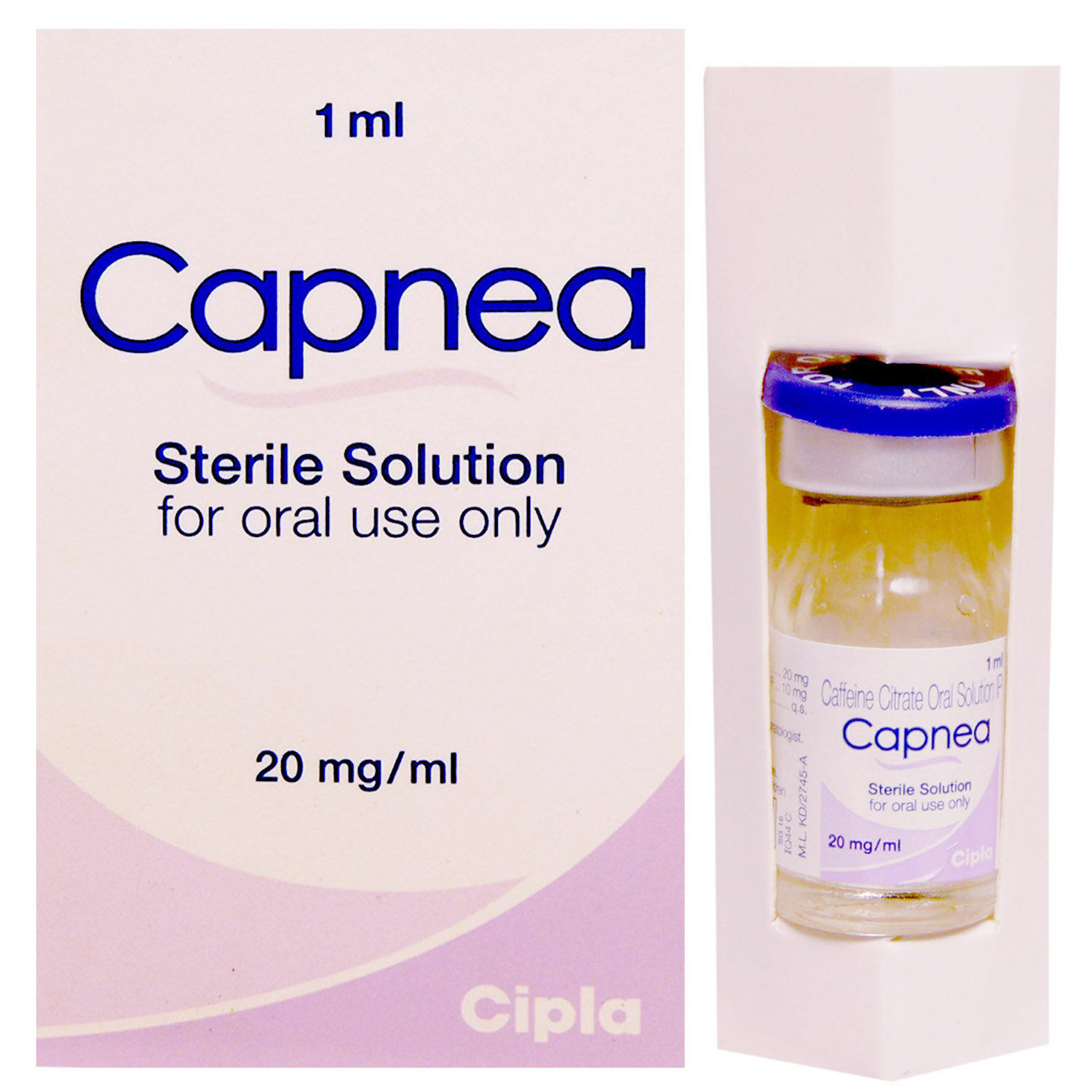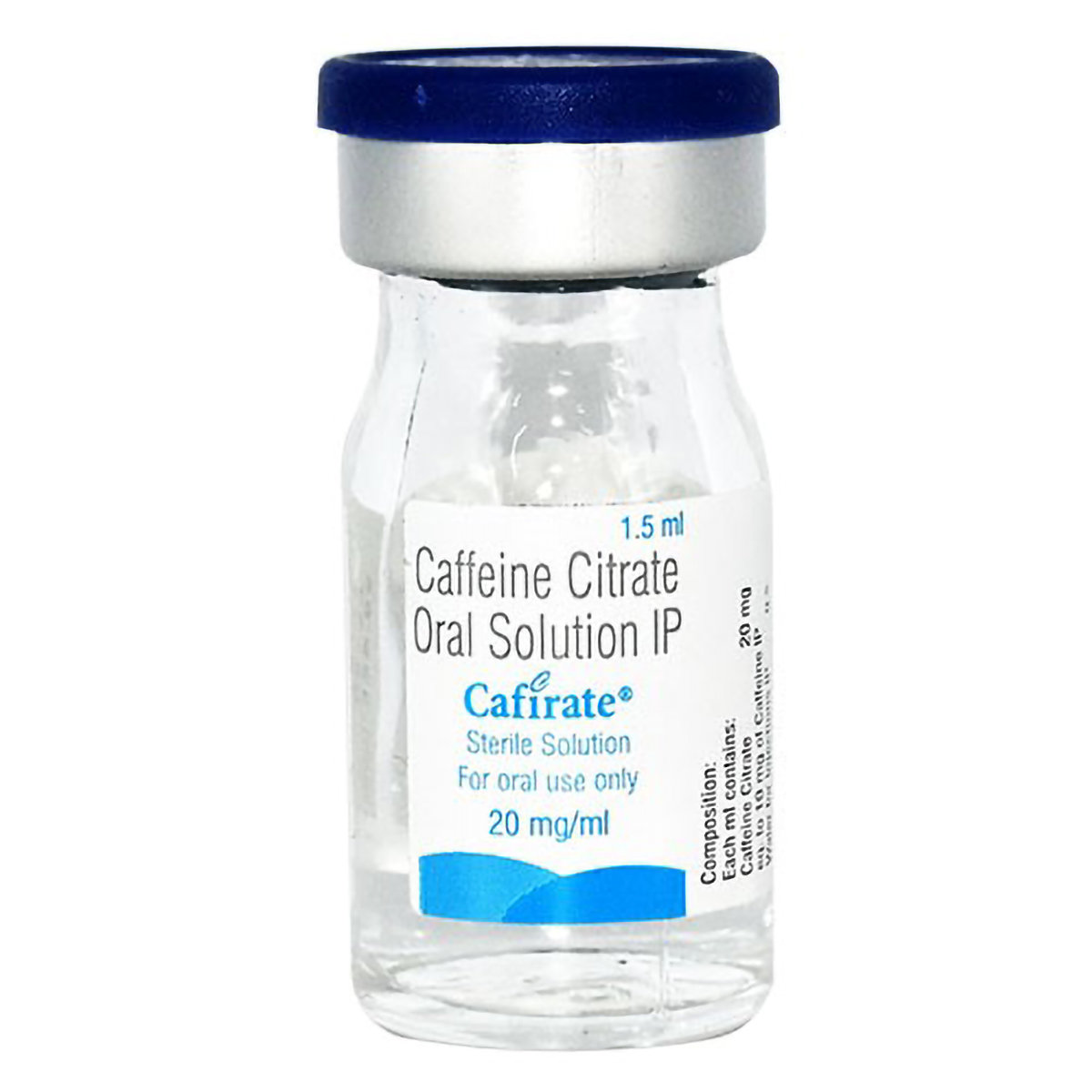Apnicaf Oral Solution 3 ml
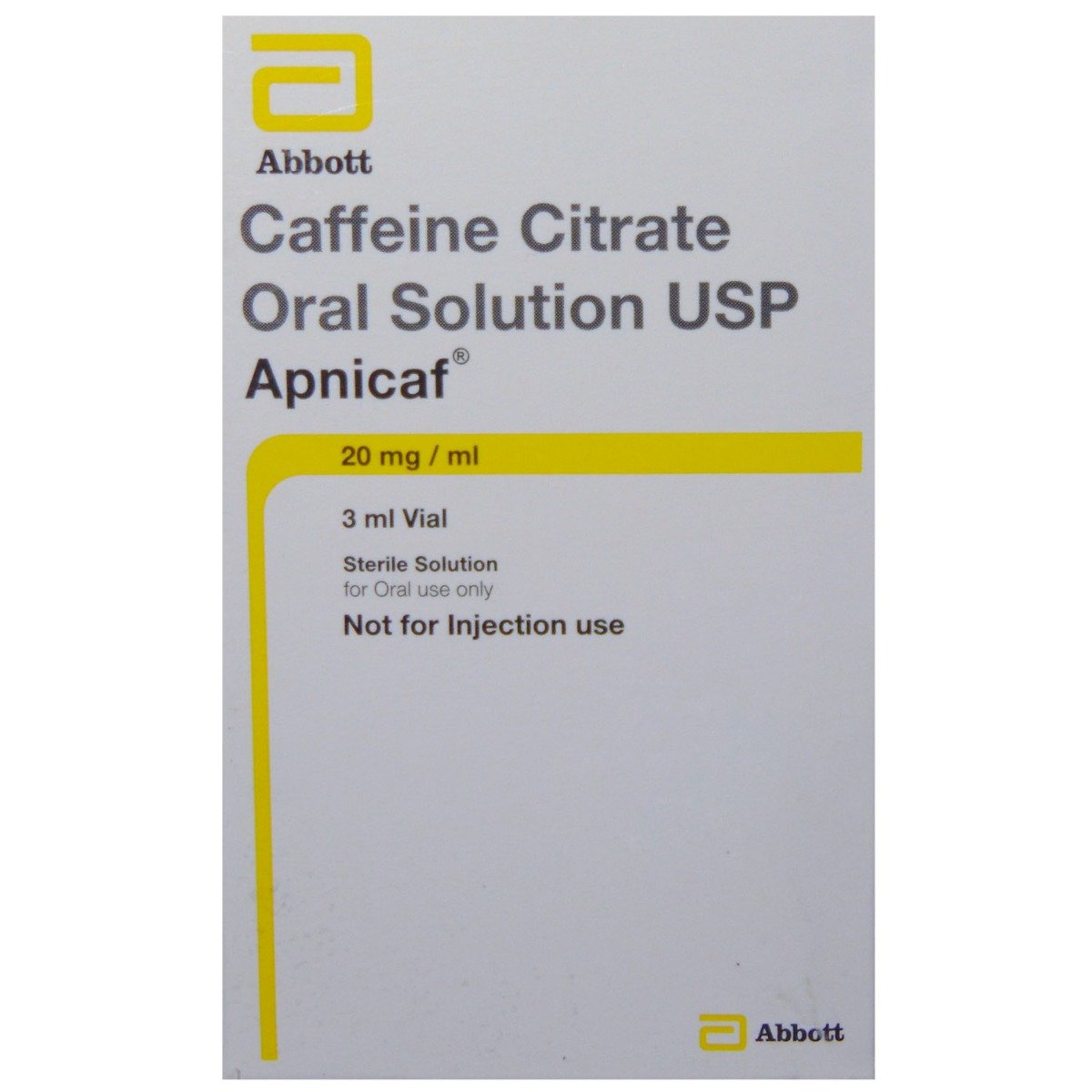
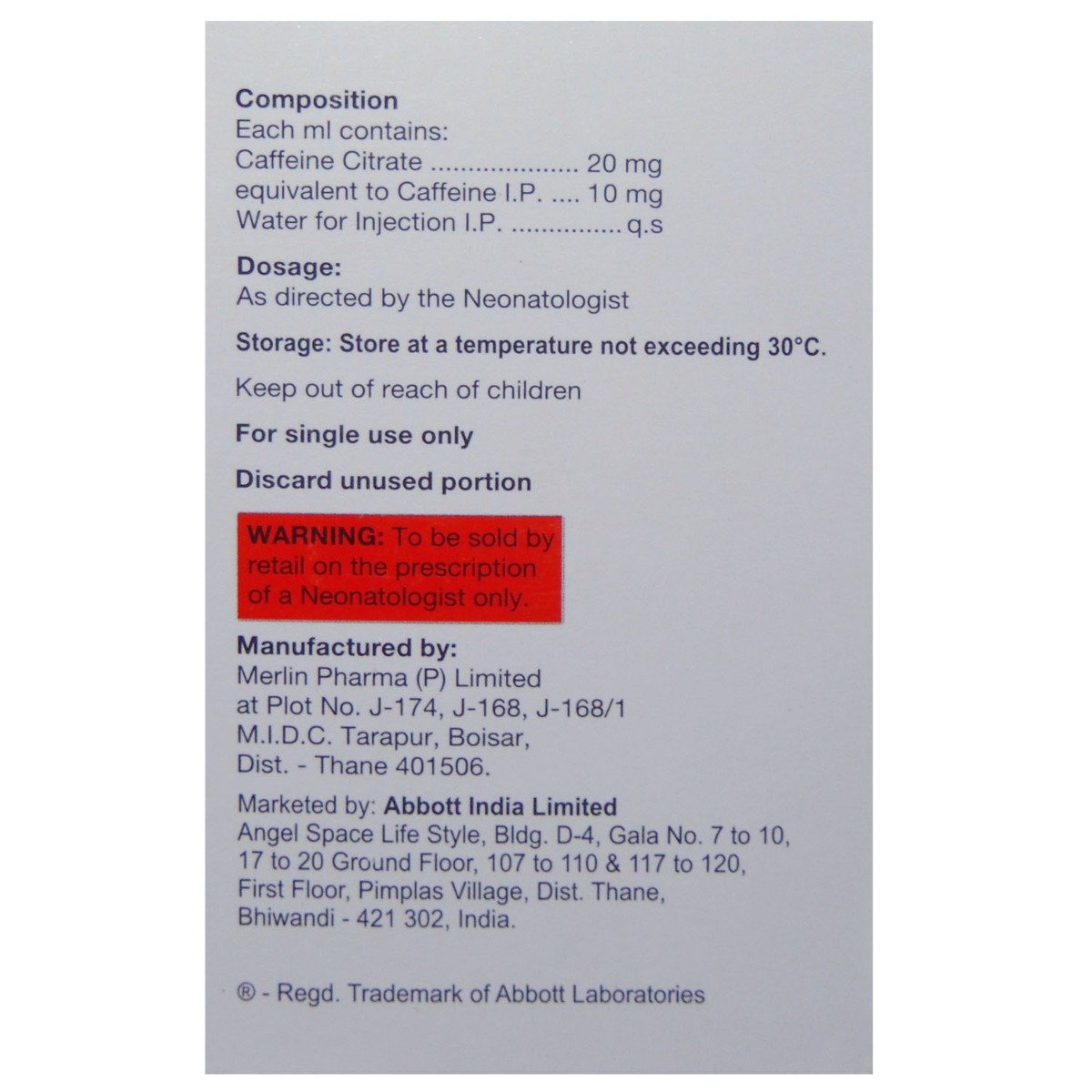
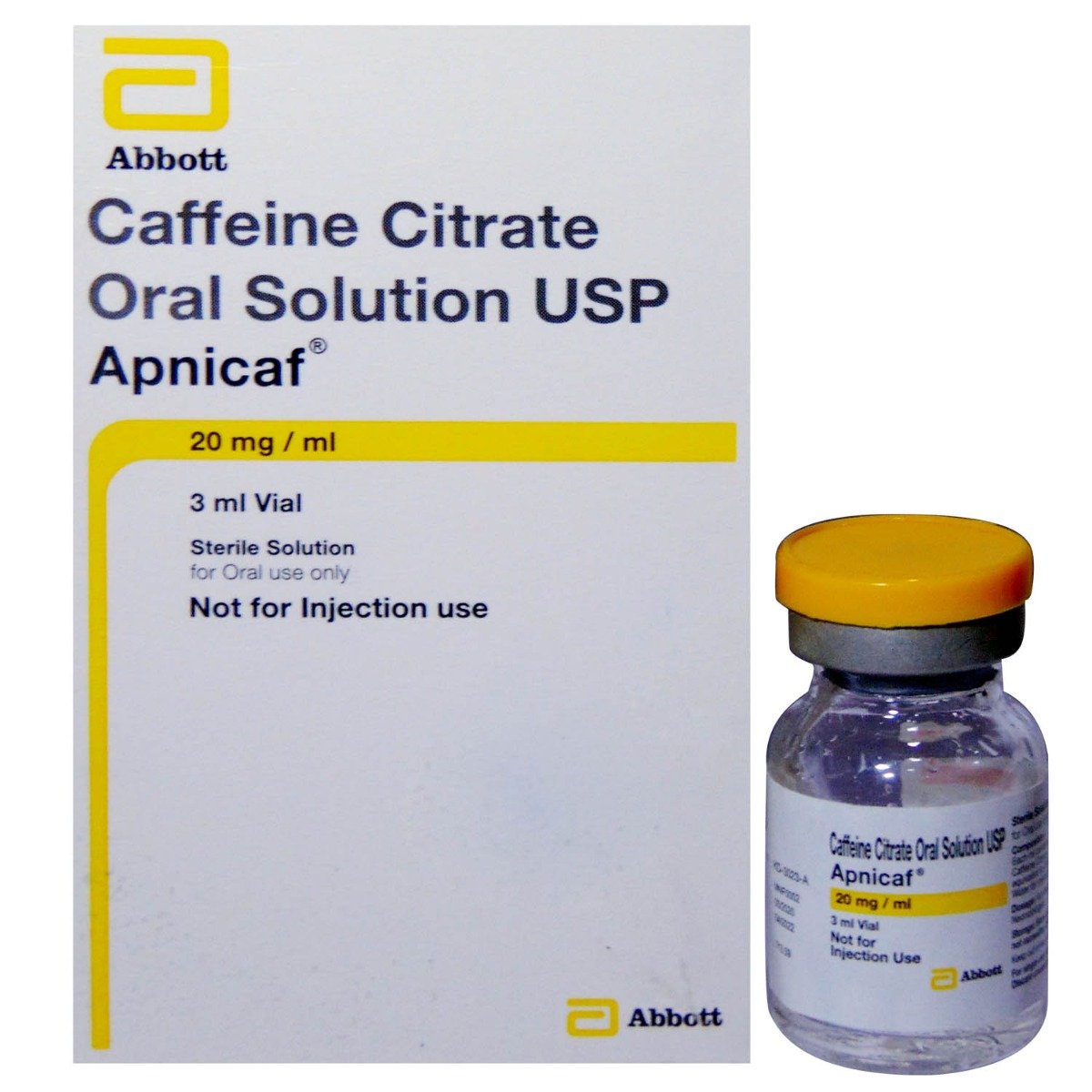
Selected Pack Size:3 ml
3 ml ₹723.6
(₹241.2 / 1 ml)
Out of stock
1.5 ml ₹348.3
(₹232.2 / 1 ml)
Out of stock
MRP ₹804
(Inclusive of all Taxes)
₹120.6 Cashback (15%)
Know Your Delivery Time
Provide Delivery Location

Secure Payment

India's Most Trusted Pharmacy

Genuine Products
Synonym :
Composition :
Manufacturer/Marketer :
Consume Type :
Return Policy :
Expires on or after :
About Apnicaf Oral Solution 3 ml
Apnicaf Oral Solution 3 ml belongs to a group of medicines known as methylxanthines. It is used to treat primary apnoea of premature newborns (interrupted breathing in premature babies). Apnea is a condition where breathing interrupts and causes abnormal heart rate and oxygen saturation alterations. It is a common occurrence, particularly in premature infants.
Apnicaf Oral Solution 3 ml contains 'Caffeine Citrate', which belongs to the central nervous system (CNS) stimulants class. It works in three different ways. Firstly, it is the adenosine receptor antagonist; secondly, it is a phosphodiesterase inhibitor. And thirdly, it is an active intracellular calcium mobiliser. Collectively Caffeine stimulates the respiratory centre, sensitising it to hypercapnia. Thereby Apnicaf Oral Solution 3 ml effectively regulates the mean respiratory rate and tidal volume, improves pulmonary blood flow, decreases carbon dioxide sensitivity and enhances diaphragmatic function and breathing pattern.
Apnicaf Oral Solution 3 ml should be used as prescribed by your doctor. Your doctor will determine the suitable dosage based on your infant's medical conditions. In some cases, Apnicaf Oral Solution 3 ml can cause side effects like tachycardia (fast heartbeat), arrhythmia (irregular heartbeat) and hyperglycaemia (increased sugar in blood or serum). These side effects are not prevalent and vary from person to person. Consult your doctor if these symptoms continue or worsen. They may be able to recommend strategies to avoid or minimise certain side effects.
Inform your doctor about the complete medical history of your infant. If you are nursing your infant is being treated with this medication, avoid drinking coffee or using any other caffeine-containing products since Caffeine passes into breast milk. This medication should be used with caution in infants with impaired hepatic or renal function. Before fixing the dose, your doctor may assess baseline serum caffeine levels in children born to caffeine-consuming mothers.
Uses of Apnicaf Oral Solution 3 ml
Apnicaf Oral Solution 3 ml is used in the treatment of primary apnea of premature newborns. The detailed uses of Apnicaf Oral Solution 3 ml are as follows:
- Treats Primary Apnea in Premature Newborns: Apnicaf Oral Solution 3 ml stimulates the brain's respiratory centre to improve and regulate breathing patterns in newborns with apnea (interrupted breathing). It enhances blood circulation in the lungs to improve oxygen delivery, strengthens the diaphragm for more effective breathing, and helps the baby's body respond better to changes in carbon dioxide levels, thereby reducing episodes of apnea.

Have a query?
Directions for Use
- Apnicaf Oral Solution 3 ml can be given with or without food as advised by your doctor.
- Follow your doctor’s instructions regarding the dosage and duration of the medication.
- Apnicaf Oral Solution 3 ml is given by mouth or through a feeding tube as directed by the doctor.
- Measure the prescribed dose using a suitable syringe and administer it as directed by your doctor.
Medicinal Benefits
Apnicaf Oral Solution 3 ml contains 'Caffeine Citrate', which belongs to the central nervous system (CNS) stimulants class. It works in three different ways. Firstly, it is the adenosine receptor antagonist; secondly, it is a phosphodiesterase inhibitor. And thirdly, it is an active intracellular calcium mobiliser. Collectively Caffeine stimulates the respiratory centre, sensitising it to hypercapnia. Thereby Apnicaf Oral Solution 3 ml effectively regulates the mean respiratory rate and tidal volume, improves pulmonary blood flow, decreases carbon dioxide sensitivity and enhances diaphragmatic function and breathing pattern.
How Apnicaf Oral Solution 3 ml Works
Storage
What if I have taken an overdose of Apnicaf Oral Solution 3 ml
Drug Warnings
Inform your doctor about your infant's medical history. If you are breastfeeding and your infant is being treated with this medication, avoid drinking coffee or using any other caffeine-containing products since caffeine passes into breast milk. Apnicaf Oral Solution 3 ml should only be used in a neonatal intensive care unit where adequate patient surveillance and monitoring facilities are available. Treatment should begin under the supervision of a neonatologist with experience in neonatal intensive care. This medication should be used with caution in infants with impaired liver or kidney function.
Habit Forming
Therapeutic Class
All Substitutes & Brand Comparisons
RX
Capnea Solution 1ml
Cipla Ltd
₹257.5
(₹231.8/ 1ml)
3% CHEAPERRX
CAFIRATE SOLUTION 1.5ML
Sun Pharmaceutical Industries Ltd
₹386.5
(₹231.93/ 1ml)
3% CHEAPER
Alcohol
Caution
Apnicaf Oral Solution 3 ml is intended to use in premature newborns/neonates.
Pregnancy
Caution
Apnicaf Oral Solution 3 ml is recommended to be used only in infants.
Breast Feeding
Caution
Apnicaf Oral Solution 3 ml is intended for use in newborns/neonates only. If your infant is being treated with this medication, avoid drinking coffee or using any other caffeine-containing products since caffeine passes into breast milk.
Driving
Caution
Apnicaf Oral Solution 3 ml is intended to use in premature newborns/neonates.
Liver
Caution
Apnicaf Oral Solution 3 ml should be used with caution in infants with impaired hepatic or liver function.
Kidney
Caution
Apnicaf Oral Solution 3 ml should be used with caution in infants with impaired renal or kidney function.
Children
Caution
Apnicaf Oral Solution 3 ml is intended to use in premature newborns/neonates.
Heart
Please inform your doctor if your child has any heart problems before giving Apnicaf Oral Solution 3 ml.
Geriatrics
Not applicable
Apnicaf Oral Solution 3 ml is for paediatric patients only.
FAQs
Apnicaf Oral Solution 3 ml belongs to a group of medicines known as methylxanthines. It is used to treat primary apnoea of premature newborns (interrupted breathing in premature babies).
Apnicaf Oral Solution 3 ml contains 'Caffeine Citrate', which belongs to the central nervous system (CNS) stimulants class. It works in three different ways. Firstly, it is the adenosine receptor antagonist; secondly, it is a phosphodiesterase inhibitor. And thirdly, it is an active intracellular calcium mobiliser. Collectively Caffeine stimulates the respiratory centre, sensitising it to hypercapnia. Thereby Apnicaf Oral Solution 3 ml effectively regulates the mean respiratory rate and tidal volume, improves pulmonary blood flow, decreases carbon dioxide sensitivity and enhances diaphragmatic function and breathing pattern.
No, it is intended to treat primary apnoea of premature newborns/neonates.
The dosage is determined by your baby's weight, medical problems, and responsiveness to therapy. Before determining the dose, it is also necessary to establish the baseline serum caffeine levels in children born to caffeine-consuming mothers.
Country of origin
Manufacturer/Marketer address
Disclaimer
Author Details
We provide you with authentic, trustworthy and relevant information
Reference
- https://www.sciencedirect.com/science/article/pii/S1875957217301778
- https://www.medicines.org.uk/emc/medicine/26467#gref
- https://www.medicines.org.uk/emc/files/pil.5145.pdf
- https://www.ncbi.nlm.nih.gov/pmc/articles/PMC4637812/
- https://pubmed.ncbi.nlm.nih.gov/2704353/
- https://www.accessdata.fda.gov/drugsatfda_docs/label/2020/020793s019lbl.pdf
- https://www.medicines.org.uk/emc/medicine/26467#INDICATIONS
- https://kidshealth.org/en/parents/aop.html
- https://www.accessdata.fda.gov/drugsatfda_docs/label/2000/20793s1lbl.pdf
Buy best C.n.s Drugs products by
Intas Pharmaceuticals Ltd
Sun Pharmaceutical Industries Ltd
Torrent Pharmaceuticals Ltd
Alkem Laboratories Ltd
Alteus Biogenics Pvt Ltd
Abbott India Ltd
Cipla Ltd
Micro Labs Ltd
Lupin Ltd
Tripada Healthcare Pvt Ltd
D D Pharmaceuticals Pvt Ltd
Ipca Laboratories Ltd
Arinna Lifesciences Ltd
Icon Life Sciences
Linux Laboratories Pvt Ltd
Mankind Pharma Pvt Ltd
Cnx Health Care Pvt Ltd
East West Pharma India Pvt Ltd
La Renon Healthcare Pvt Ltd
Emcure Pharmaceuticals Ltd
Eris Life Sciences Ltd
Leeford Healthcare Ltd
Talent India Pvt Ltd
Consern Pharma Ltd
Tas Med India Pvt Ltd
Macleods Pharmaceuticals Ltd
Zydus Healthcare Ltd
Jagsam Pharma
Troikaa Pharmaceuticals Ltd
Dr Reddy's Laboratories Ltd
Ikon Pharmaceuticals Pvt Ltd
Matias Healthcare Pvt Ltd
Sigmund Promedica
Aristo Pharmaceuticals Pvt Ltd
Ardent Life Sciences Pvt Ltd
Shine Pharmaceuticals Ltd
Zydus Cadila
Theo Pharma Pvt Ltd
Wockhardt Ltd
Propel Healthcare
Lifecare Neuro Products Ltd
Crescent Formulations Pvt Ltd
Mesmer Pharmaceuticals
Matteo Health Care Pvt Ltd
Reliance Formulation Pvt Ltd
Morepen Laboratories Ltd
Ajanta Pharma Ltd
Capital Pharma
Neon Laboratories Ltd
Med Manor Organics Pvt Ltd
Akumentis Healthcare Ltd
Lyf Healthcare
Msn Laboratories Pvt Ltd
Sanix Formulation Pvt Ltd
Pulse Pharmaceuticals
Brainwave Healthcare Pvt Ltd
Hetero Healthcare Pvt Ltd
Cyrus Remedies Pvt Ltd
Sanofi India Ltd
Solvate Laboratories Pvt Ltd
Elder Pharmaceuticals Ltd
Novartis India Ltd
Psyco Remedies Ltd
Medishri Healthcare Pvt Ltd
Quince Lifesciences Pvt Ltd
Alniche Life Sciences Pvt Ltd
Crescent Therapeutics Ltd
Hbc Life Sciences Pvt Ltd
Mova Pharmaceutical Pvt Ltd
Prevego Healthcare & Research Pvt Ltd
Cadila Healthcare Ltd
Tripada Lifecare Pvt Ltd
Alembic Pharmaceuticals Ltd
Solis Pharmaceuticals
Talin Remedies Pvt Ltd
Kivi Labs Ltd
Serotonin Pharmaceuticals Llp
Glenmark Pharmaceuticals Ltd
Infivis Life Care
Aareen Healthcare Pvt Ltd
Trion Pharma India Llp
A N Pharmacia Laboratories Pvt Ltd
Gagnant Healthcare Pvt Ltd
Primus Remedies Pvt Ltd
Crescent Pharmaceuticals
Glarizonto Pharma Pvt Ltd
Knoll Healthcare Pvt Ltd
Lyceum Life Sciences Pvt Ltd
Wallace Pharmaceuticals Pvt Ltd
Zuventus Healthcare Ltd
Arches Pharmaceuticals
Cadila Pharmaceuticals Ltd
Divine Savior Pvt Ltd
Lia Life Sciences Pvt Ltd
Lincoln Pharmaceuticals Ltd
USV Pvt Ltd
Vasu Organics Pvt Ltd
Corona Remedies Pvt Ltd
Glial Life Science Llp
Maneesh Pharmaceuticals Ltd


